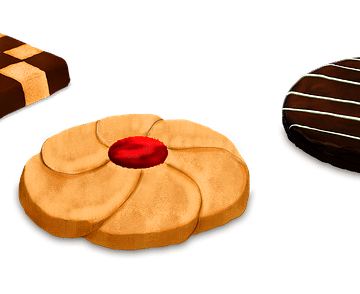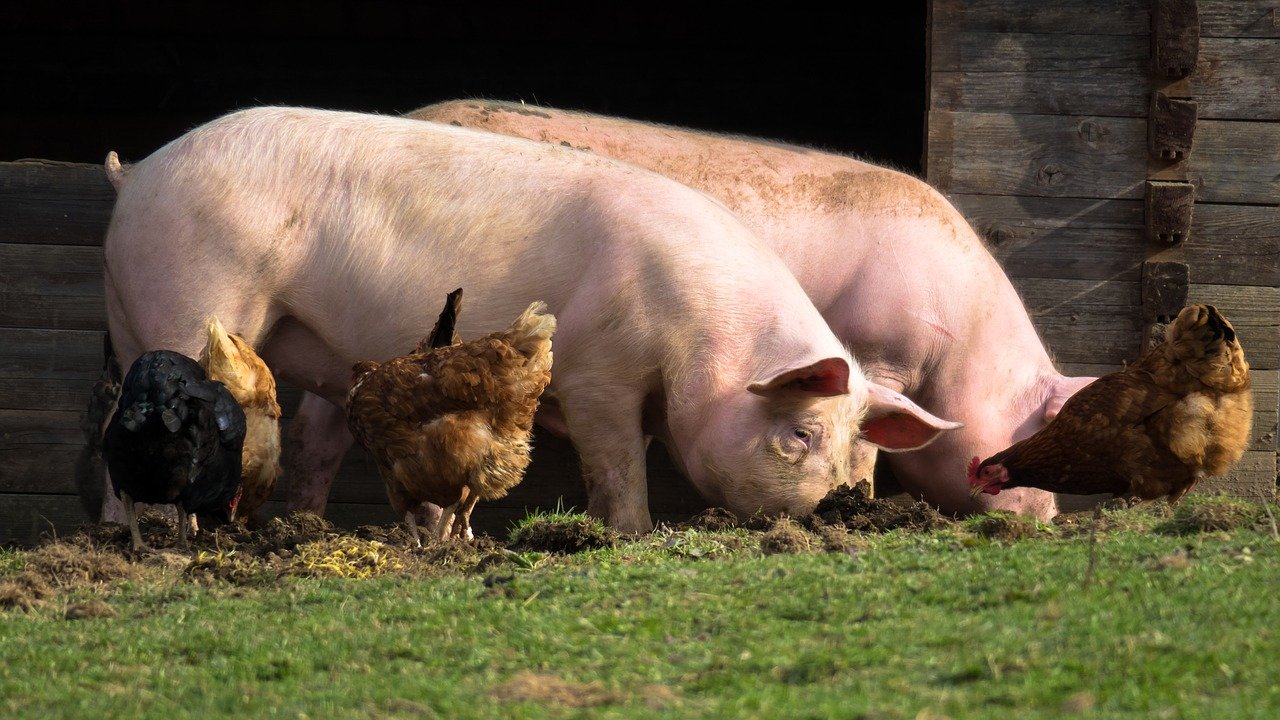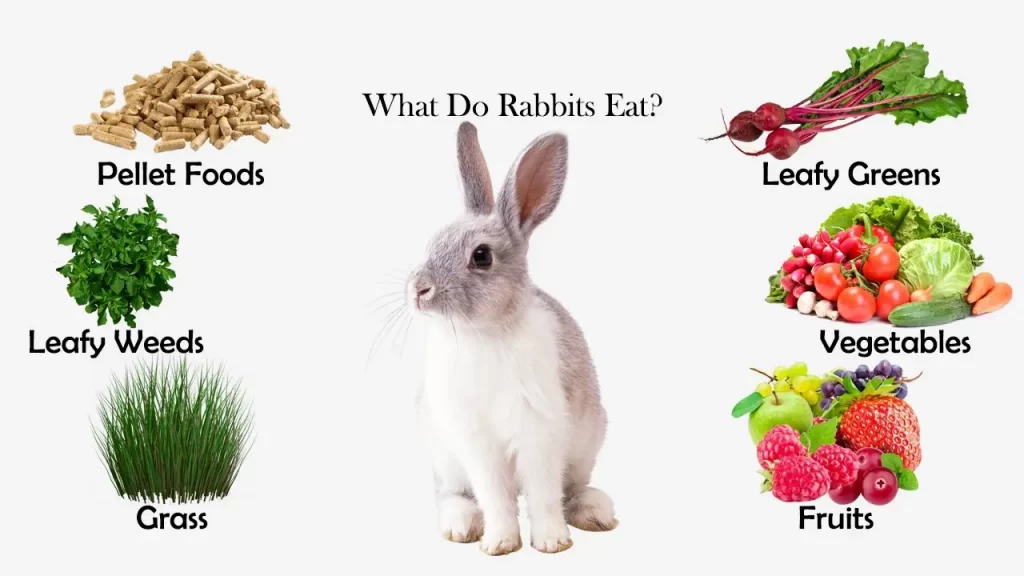To raise healthy rabbits, then you need to offer them a balanced diet
In today’s article, you will learn what to feed rabbits, rabbit pellets ingredients, and the best rabbit feed formula on how to feed the little rabbits properly.
Rabbits that are on free-range mainly feed on green grasses, and fruits.
However, rabbits that are reared with the intensive method should be given foods that are rich in carbs, protein, minerals, and vitamins.
Natural sources of food nutrients should also be preferred because rabbits need fresh plant food.
- Hay for Rabbits
One of the most important staple foods for rabbits is hay.
While fresh fodder is better during winter, dried grasses are still okay for rabbits during summer when fresh fodder is scarce.
Well-preserved hay should always be available and constitute at least 65% of the daily feed intake.
Rabbits love hay, it does not make them fat and does not cause gastrointestinal problems.
However, you should ensure there are no additives or foreign materials that cause ill health to bunnies.
Due to the high crude fiber content of hay, rabbits can digest it easily.
Rabbits that eat hay regularly can also prevent certain dental problems.
However, the hay should come from a natural meadow and should neither be moist, dusty nor lignified.
Low-quality hay that is yellowish or greyish should be avoided.
- Fresh Fruits and Vegetables
Rabbits are herbivores and feed mainly on fresh green grasses.
Vegetables are however important in their diet and should be consumed every day
Fruit can also be fed to bunnies from time to time.
The exact amount of food varies, depending on breed, age, sex, and health conditions.
Even at that, you should offer adequate feeds to your bunnies without the fear of over-feeding as they decide when to stop eating.
Rabbits love variety, therefore, you should make sure you give them different kinds of fruit and vegetables.
The following are some of the fruits and vegetables rabbits can eat
Apple (without the seeds), Melon, Cherries (without the seeds), Grapes, Banana, Nectarine, and Orange.
Kohlrabi, mustard greens, watercress, Cilantro, Bok choy, cilantro, beet greens, Broccoli greens, and basil.
A few of the best-suited fruits for feeding bunnies are example carrots, fennel, celery, or parsley root.
A combination of fruits such as strawberries, pears, apples Pineapple, apricot, and blackberries is also recommended.
It is worth knowing that many types of fruit can also affect the rabbit’s health.
Strawberries, for example, are rich in water and vitamins and can provide relief for bladder and kidney problems.
Pear also has the same effect on rabbits but should be avoided if the rabbit has intestinal parasites.
Blackberry can be used against inflammation and blocked airways.
Its leaves clear the respiratory tract, fight against inflammation, and regulate body heat, especially in summer.
Honeydew melon is also affected by heat regulation in rabbits.
Heat regulation is very important to rabbit farmers since rabbits can suffer from heatstroke.
Apples, on the other hand, are said to have a digestive effect.
When adding fruit to their food, it is important to remember that different varieties should be given in a proper ratio, and they should not be fed more than 1-2 times per week.
Cabbage is also given to bunnies because it’s rich in nutrients, especially as winter food.
Chinese cabbage and kohlrabi leaves are the best digestible cabbage.
However, care should be taken when feeding rabbits with cabbage because it quickly becomes bloated and can cause the rabbit severe stomach pains.
Sudden changes in the rabbits’ diet should be avoided at all costs.
You should always introduce new foods to your rabbits slowly and in small amounts to test their tolerance.
- Natural Food Plants and Herbs
Meadow green is the most natural form of nutrition for rabbits.
Similar to hay, it promotes tooth abrasion through prolonged chewing and has a high crude fiber content.
The more varieties of herbs and grasses you offer rabbits, the better the health benefits derived from the food.
However, the sources of the foods should be carefully selected.
Plucked dandelions from the roadside should be avoided in feeding rabbits.
Green plants should come from natural meadows, for example from nature reserves or biotopes.
Typical meadow flowers like daisies or ribwort plantain can be fed without hesitation.
Some rabbits can also feed on the branches of hornbeam, hazelnut, or other plants.
Rabbits also enjoy basil, chamomile, lemon balm, and parsley as snacks.
If the rabbit suffers from loss of appetite, cramps, or digestive problems, for example, feeding basil can provide relief. Savoury is also recommended.
Dill is a real vitamin C source and can be fed more often to rabbits.
It also supports milk production in lactating rabbits and helps to get rid of colic.
Chervil and tarragon are not only healthy components of a balanced diet but also have a soothing effect on bladder and kidney problems in rabbits.
- Are ready-made foods good for Rabbits or not?
A domestic rabbit that is not used for breeding purposes does not need dry, concentrated, or fattening food if it is fed a balanced diet.
Often, this industrially produced food contains too much grain, which is not easy for rabbits to digest.
Other ingredients that are typical of canned foods are sugar, starch, and high-fat content.
These ingredients usually cause digestive problems and overweight in rabbits, including other corresponding health issues.
If dwarf rabbits feed on such food for a long time, they can lose their appetite for greenery and quality hay.
This not only slows down digestion but also leads to a lack of important nutrients such as vitamins and fiber.
However, if one does not want to give up feeding dry fodder, it is essential to pay close attention to the ingredients.
The food should contain a minimum of 16% crude fiber content and a 3% maximum fat content.
However, the feed mixture should be given in small quantities (maximum 20 g per day) and never as a substitute for green or juice feed.
- Snacks & Treats for Rabbits
Pet rabbits love treats, especially when you offer them regularly
But snack bars and other treats from supermarkets contain cereals, corn, molasses, and sugar.
Although your rabbits love the taste, such a diet is not healthy.
Healthy snacks that are available in a pet shop contain herb mixes, rose hips or dried apple slices, green oats, nettles, and dandelions.








